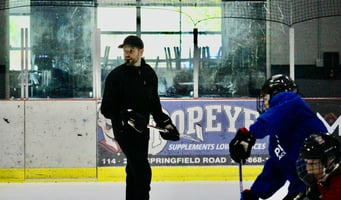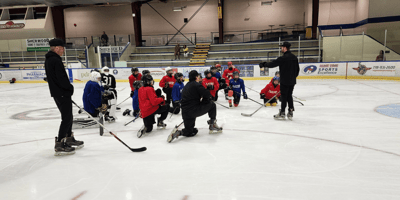In the pursuit of excellence in hockey, dedicated players and coaches are always on the lookout for...
Dealing With Change In Hockey & Life
The only constant in our universe is change. Everything is always changing. Birth, life, death, and rebirth of the atomic world are constantly reshuffling matter into new forms and shapes that we experience in our daily reality.
What is change? It could be a number of things such as changing a habit, learning a new skill, or a big life change.
Change can be something we resist and sometimes it could be something we desire. There are things we can change that are within our control and others that we cannot control.
The things within our control are easier to change because with a little bit of effort, planning, organization, and resilience we can usually facilitate the change we wish to see in our lives.
However, things that are beyond our control tend to be more challenging. There is a saying that goes like this, “when you change the way you look at things, the things you look at change”. It could reveal that we may not be able to change a circumstance that is beyond our control, but if we change our perspective on it, we see that the circumstance given to us from beyond our control is exactly what is meant to be!
Perhaps if we are open to change, embrace it, and go with the flow then life doesn’t always have to be difficult. On the other hand what if we are constantly resisting change?
Here are a few reasons why change can be difficult:
1) We try to change everything at once.
Trying to change everything at once can be very overwhelming and lead to losing focus on a specific area we are trying to change. Instead, simply pick one skill or habit you wish to change in your life and focus on that.
It may be the daily task of eating an apple instead of an Oreo cookie. With enough practice, the newly acquired skill or habit will become natural. When a skill or habit is natural it becomes automatic, which means you don’t have to think about it. Once you reach this stage, you are ready to change the next skill or habit. Eventually, each small change will lead to a grand transformation.
2) We try to change others.
Trying to change others means we avoid trying to change ourselves. It’s always a great way to distract ourselves from taking the first step to self-improvement. Quite often this stems from not seeing the benefits of change. Why? Because we tend to know what’s best for ourselves and others, but knowing is not action. Taking action on what we know we want to alter, modify, or replace is the definition of change. It’s about taking ownership of change. If we wait for the world to change, we will wait forever. If we are the light and example right now it will encourage others to follow in our footsteps.
As Gandhi says, “Be the change you wish to see”. Dedicate time to changing yourself so that you have no time to criticize others. If you want to feel powerless try to change others. If you want to feel powerful, start by changing habits in your own life. Watch your motivation, confidence, and enthusiasm for life grow.

3) One change involves other changes.
Changing one habit in life can open the door to changing many other habits. For many, this can be a deterrent. For example, we may feel the need to change how we eat. Once we make that choice to eat better, we may have to change other things such as where we shop for groceries, how we serve the food, how we prepare it, and when we
eat it. Be aware that these changes may thwart your efforts to change.
Take a moment to reflect on your goal to eat better. Write down all the ideas for change that come to you in order of priority. Many times keeping things in our head is confusing which is why writing down ideas can enhance clarity. This will make it easier to take the first step to change. Remember, small-scale changes lead to big-scale transformations.
Start small and focus on one element of change at a time.
4) Comfort is safety.
Here’s something to consider, “if you want something you’ve never had, then you’ve got to do something you’ve never done”. Doing something you’ve never done before can be scary because you step into unknown territory. As long as we are comfortable and secure we may not have the willingness to change. This way we can keep experiencing what we are familiar with and get the same results over and over again.
Doing something uncomfortable every day is a great way to change up your daily routine and get a different result. It may be brushing your teeth with your less dominant hand. It could even be practicing a brand new skill in hockey that is completely foreign like backhand toe drags or edge control in power skating. In time, this can breed different results
that may surprise you. If you never try you’ll never know. Step outside of your comfort zone and see for yourself.
5) The outcomes of change aren’t clear.
Another thing to consider is we might not be convinced that the change we want to make will lead to the desired outcome. This can dampen our spirits and prevent us from taking the first step to change a habit. For example, we may see a player or coach demonstrating some tremendous skill on the ice. When we watch the demonstration it looks easy, but when we try the skill demonstrated, it all falls apart.
How we think at this moment will greatly affect the desired outcome. It can feel like the skill is too advanced and that there is no possible way to demonstrate the same skill observed. This mindset if constant can imprint permanently on the mind and eventually lead to an attitude of “I can’t…” Not only will this translate to hockey but other areas of
life.
.jpg?width=5760&height=3840&name=pexels-nathan-cowley-897817%20(1).jpg)
On the contrary, another approach could be to not be deterred by failure and to keep trying again. Practice is the key to mastering a skill. Reaching out to players and coaches who can give essential key pointers can make the outcomes of change clear.
When we develop clarity and steps toward our goal it makes change more motivating whereas being unclear usually stems from fear of failure and lack of clarity in what the next steps are.
Be mindful of how you think about change. Observe how others do things and perhaps even ask them for help. It can make change a lot easier.
6) We expect quick fixes in life.
Be patient! Change is not a destination, it’s a journey! Quite often people expect instant results with one change. As discussed earlier, one change can interconnect and open up many other possibilities. Don’t be discouraged by all the possibilities in front of you. Expect change not to feel normal. Expect to put in the effort. That means you are on the right path.
Quick fixes will not feel as rewarding as putting in the effort, focus, and persistence to make changes that reflect your desired outcomes. Why, because we gain experience throughout the process of change. Experience is what is needed to convert the image of your beliefs into physical reality.
Sometimes the quickest fix is not changing at all.
A quick fix example would be a hockey player instructed by the coach to lengthen out strides for the benefit of maximizing top speed and efficiency. The goal of the player is to become faster. Right now the player cannot evolve from short and choppy strides to long powerful strides. Think of it as being stuck in first gear on a highway. The engine
is revving high but the car is moving super slow.
The same thing is happening on the ice as the player's feet appear to be moving super-fast but the pace of the player is very slow. The coach gives some edge control drills to the player for converting short strides to long powerful strides. The player struggles with the exercises give up and stop practicing the coach's tips.
Has the player improved? Probably not.
So the player reverts back to what is most comfortable and is demonstrating the same results as before. Perhaps if the player believed in a future outcome of the desired result with more patience, practice, effort, and focus it would eventually lead to becoming a faster skater. The choice is always yours.
Final thoughts, Player Acceleration Hockey Development has been developing hockey players for years and has observed many players transform their game and life through extensive hockey camps and mentorship programs. The programs offer wellness sessions that guide players not just on how to cope with change, but how to thrive with change using easily applicable meditation and mindset techniques.






